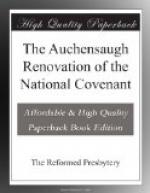In the prosecution of this doctrine, he had occasion also to insist upon the reasons, or motives, and manner of entering into covenant. The scope and argument of the reasons adduced as motives to the duty of covenanting was to this effect:—
1. The turning away of the Lord’s wrath and anger from a land, or people, which covenant-breaking hath deserved, may be a motive to renewing covenant with God; this was the motive that prompted the good reforming King Hezekiah to make a covenant with the Lord, 2 Chron. xxix. 10—“Now it is in mine heart to make a covenant with the Lord God of Israel, that his fierce wrath may turn away from us.” And Nehemiah, with the returned captives, Neh. ix. 38—“And because of all this, we make a sure covenant.”
2. Reviving and advancement in reformation, being the ordinary consequent and effect of upright covenanting with the Lord, may be another motive and inducement thereunto; this appears both in personal and national covenanting—In personal, Psal. cxix. 106—“I have sworn, and I will perform it, that I will keep thy righteous judgments.” The Psalmist’s having sworn, was a very quickening consideration to excite him to the performance of his duty. In national covenanting, we always find, after the people of Israel and Judah had covenanted with the Lord, they made progress in reformation, and the land was purged of abominations and idols. Thus it was in Asa’s covenant, 2 Chron. xv. 12 to 19; for there, the people have entered into a covenant with the Lord, “and sworn with all their soul, and with all their heart,” the Lord was found of them; and Asa removed his mother, Maachah, from her royal dignity, and stamped the idol which she had made, and burnt it at the brook Kidron; and he brought into the house of the Lord the things that his father and himself had dedicated. Thus it was also in Jehoiada’s covenant, which he made “between the Lord, and the king, and the people, that they should be the Lord’s people,” 2 Kings xi. 17, 18, 20; for, immediately after the making of his covenant, “all the people of the land went into the house of Baal, and brake it down—his altars, and his images brake they in pieces thoroughly; and the priest appointed officers over the house of the Lord;” and they slew Athaliah with the sword. The like is evident in Hezekiah’s covenanting, 2 Chron. xxxiv., xxxv. chapters.




